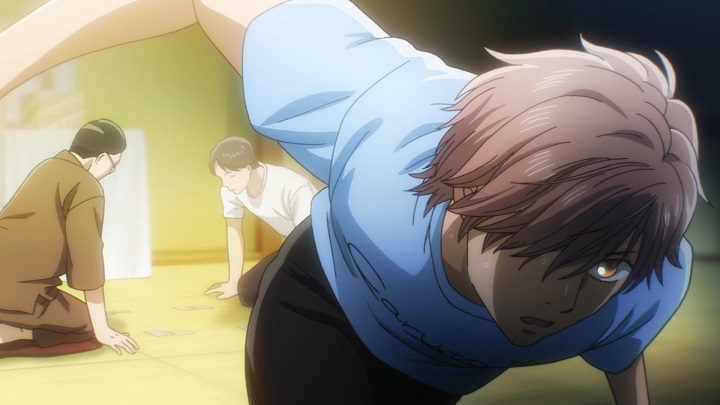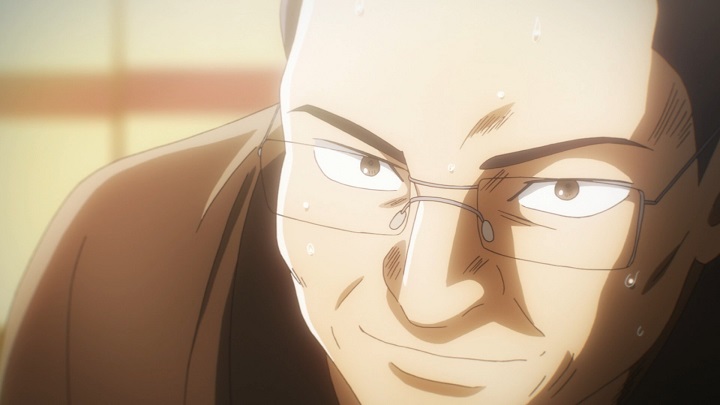What’s this? A Chihayafuru post going up the same day that the episode released? Your eyes aren’t deceiving you. I happened to have some spare time today, but more than that, “I Recall” was the rebound that the show needed after recent events, ping-ponging between half a dozen characters in two locations with great results. Years from now, when people look back on the third season, this episode will be seen as a stepping stone on the way to the Meijin and Queen title matches – but it accomplished much more than that. Sure, the matchups for the East and West qualifier finals are now set, but some of the best material here revolved around people who didn’t participate in the tournament. And then there’s Taichi, whose crushing loss in round 3 was given little time to resound, but whose character arc will certainly pivot on this moment.
Before we go any further, I’d like to say a heartfelt “thank you” to Michiru, who rips the battery from Chihaya’s cell phone at the museum of the Hundred Poets. You’d think that a karuta-related pit stop during a trip to one of Japan’s most beautiful prefectures would be enough to bring her back to the present, but Michiru realized that special measures had to be taken, and gave her an earful for good measure. I can’t say it was gratifying to see Chihaya having fun afterwards, but it was necessary, and I’m glad her obsession with a far away tournament didn’t continue for too long. It only takes a phrase from Kana, though, to remind her of Taichi’s struggle in the East Japan qualifier. As there were a multitude of characters sharing the spotlight this week, we didn’t see much of Taichi’s match before his defeat, but the show deliberately included his loss of “Impassionate gods” – Chihaya’s signature card. Both his chance at a repeat finals appearance and a symbol of Chihaya’s passion were taken from him in this episode.
Where does Taichi go from here? After coming so close to glory at the Yoshino tournament, then falling so short on a bigger stage, I can’t imagine that he’ll maintain the status quo. With his all-important senior year approaching and his mom breathing down his neck, there’s a chance that karuta will fall by the wayside for him. It’s either that, or he’ll dedicate himself to the game completely, hopefully discovering a Harada-esque passion in the process. And hey, while I’ve got both of these guys in the same paragraph, I have to ask: what was the deal with the flashback where Harada-sensei tells Taichi, “The cards that aren’t read are never, ever read”? I can’t make heads or tails of this advice, though I assume he meant to encourage Taichi to take chances and leave behind his negativity. It’s just not clear to me how such a truism can be directly connected to those ideas. Maybe CR’s translation was just suboptimal?
Whatever the case may be, Harada avenges his student with a win over Mr. Double Fault, and secures a spot in the East Japan finals. Even if the full weight of his history with Taichi didn’t reach me, his victory sure did. The combination of his knee pain, the suspenseful piano/chime piece that played in the final moments of the match, and his look of satisfaction after winning his last card were a perfect storm of gratification. Chihayafuru doesn’t highlight the poignancy of an older player’s victory as well as 3-gatsu did last year, but as far as personal successes go, Harada’s is a big one. It establishes the Shiranami Society as a dominant force in the karuta world, and likely sets the stage for his mentorship of Taichi heading into the third year of the series. Before any of that, however, he’ll have to face Sudo in the finals, who’s likely to take full advantage of his weariness. Maybe the fact that Taichi permitted him to play in the tournament will soften Sudo’s sadistic tendencies? That would give this whole tournament a rewarding karmic flavor.
The last person I want to mention this week is Shinobu. Her presence at the Western qualifier was intended to shake things up for the competitors, but instead it’s the Queen herself who was shaken. Ise-sensei, the friendly head of the Myojo Society, extends an invitation for her to practice with them, but he makes a major blunder by mentioning her grandmother. Shinobu’s relationship with her stern abuela is a strained one, and her concern that her granddaughter “has no friends” naturally doesn’t go over well. But there’s another layer to this scene. Ise once forbade Shinobu from playing against her peers, thinking that it would hinder her development – but now he wants her to practice against his new pupil, who’s right around her age. Shinobu throws the request back in his face and leaves the venue in search of solitude. There’s a sad irony to this scene, as a young woman seeks out the loneliness that she hates being accused of. Ultimately, I think Chihaya will be the one to lead her into the light, but it won’t happen until next year, when both girls are free to participate in a Queen match for the ages.




